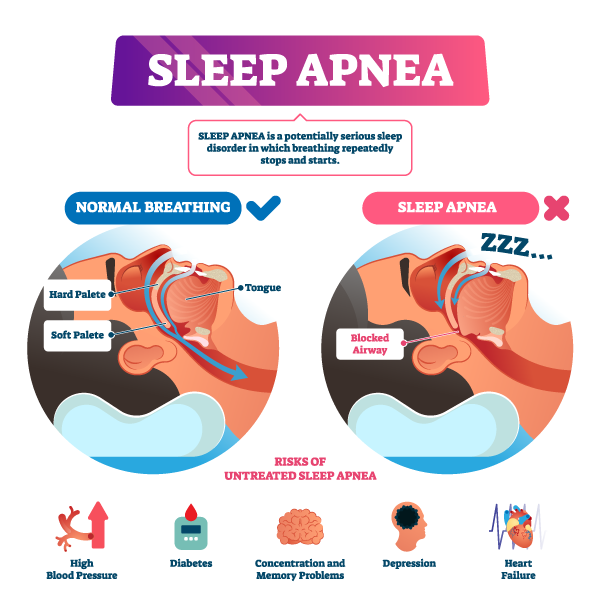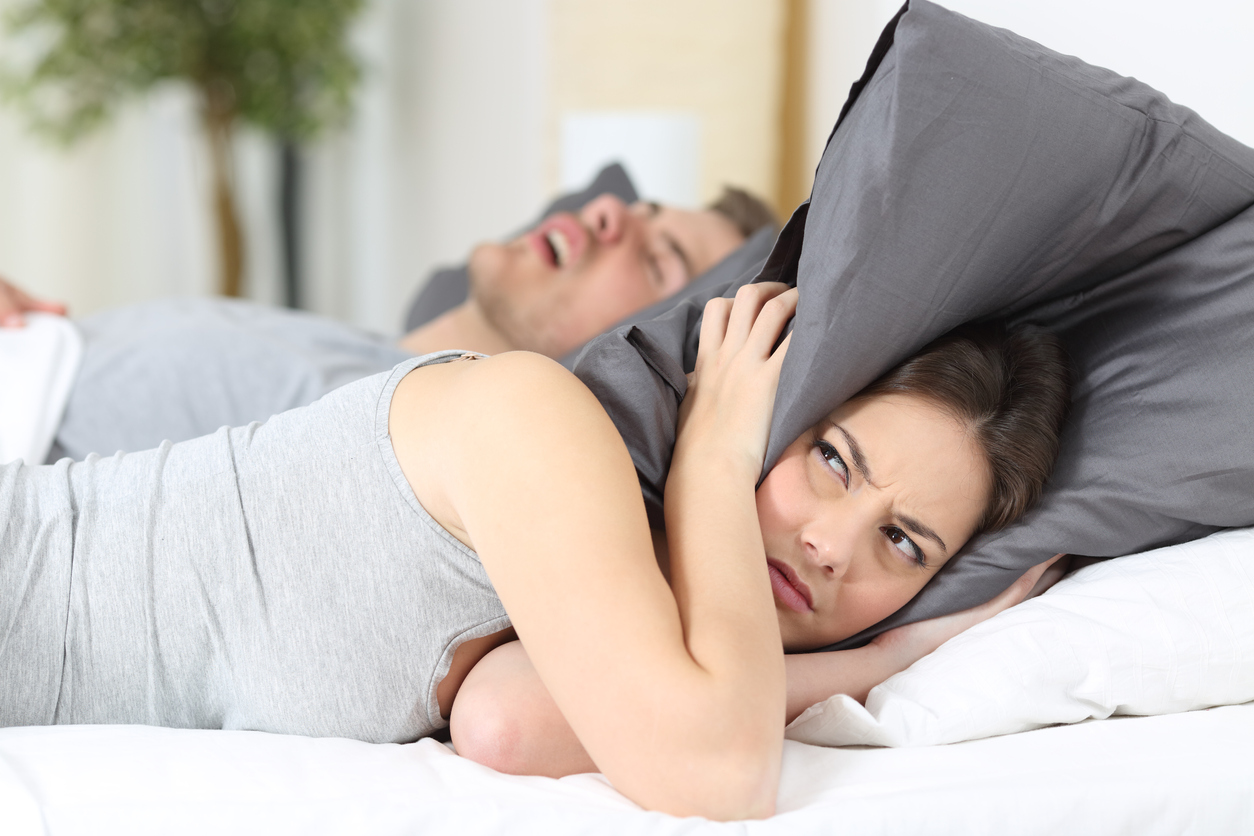
Naperville, IL 60563
Both snoring and sleep apnea can affect quality of sleep and leave you feeling tired and listless throughout the day. Sleep apnea is also a potentially life-threatening condition because it restricts the amount of oxygen reaching the brain and other organs. Here are some of the reasons you should seek help for snoring and sleep apnea treatment.
Many physicians and dentists in Naperville refer their patients to Dr. Weyneth for oral appliance consults and fittings. If you are having trouble with sleep apnea, reach out to us today to schedule an appointment!
Almost everyone snores at one point or another as we sleep. But, if you or a loved one has the issue of constantly snoring every single night, then the problem might be more serious.

There can different ways you may breathe each night while you are sleeping:
During a sleep apnea event, the tongue relaxes against the top of the throat, closing the airway. This then cuts off oxygen to the brain. After a few seconds, the body’s natural reflex kicks in and you'll startle awake so the tongue muscles tighten, open the airway, and restore airflow. A snorer often never fully awakens, but this interruption of sleep patterns causes fatigue since they aren't getting as much sleep as they should.
Many patients with sleep apnea can be complately unaware of the issue. If they have a bed partner, diagnosis may come after the partner notices the constant snoring, long pauses between breaths, and loud snorting or choking sounds that go with a startle. If there is no-one else in the room, the issue may not even be considered until other symptoms prompt an investigation.

If Your Spouses Snoring Makes It Impossible To For You To Sleep Then Sleep Apnea Could Be The Cause!
Request an AppointmentSleep apnea can cause fatigue and sleepiness during the day, irritability, depression, headaches, hypertension, and a host of other health problems. All of these symptoms triggers: oxygen deprivation and fractured sleep cycles. If you think you or someone you love has UARS or OSA, ask for a referral to or a consultation with our Naperville sleep apnea dentist, Dr. Bryan Weyneth. As one of the best dentists in Naperville, his sleep apnea experience can help you or your loved one finally have a good night's rest!
Here you can learn about the different steps that are involved in how Dr. Weyneth goes about treating sleep apnea from proper diagnosis to the best way to treat it.
Teeth grinding - called bruxism by dentists - can be a sign of sleep apnea. The body uses teeth grinding as a signal to the brain that the mouth needs to open to take a breath. In some cases of sleep apnea, the throat becomes constricted, and you can’t breathe, increasing the frequency and severity of grinding during sleep.
Grinding is problematic for several reasons. First, it can wear down teeth prematurely, causing them to appear worn and withered. Second, the wearing action makes them more prone to cavities. Thinning enamel makes it easier for plaque to break through to the interior of the tooth and cause decay. Finally, grinding can lead to problems with the jaw muscles that can be painful and difficult to remedy.Living with snoring and sleep apnea can be exhausting. Sleep apnea can cause sufferers to suddenly jolt awake as the body releases stress hormones to force breathing. This disrupts sleep and can prevent the most restful REM phases of sleep from ever occurring. Dealing correctly with snoring and sleep apnea, however, can increase energy and give you the strength and willpower you need to make other lifestyle changes. With the right treatment, you’re more able to get the restful sleep to more fully enjoy the rest of your life.
Both snoring and sleep apnea can contribute to the onset of chronic disease. People with sleep apnea, for instance, are at a much higher chance of developing obesity, high blood pressure, diabetes, and heart disease. While there’s no substitute for a healthy diet and regular exercise, coming to see us to address sleep apnea and snoring can help to secure your long term health. With the correct intervention, you can mitigate some of the adverse effects of these conditions, protecting your health now and in the future.
Snoring and sleep apnea can take their toll on the throat. The continual vibration and passing of air through a small gap can cause redness and inflammatory response which hurts in the morning. Dealing with snoring and sleep apnea directly helps to alleviate these conditions.
If you share a bed with a partner, the noise of snoring and sleep apnea can cause relationship problems. The good news is that both of these conditions are treatable at our dental practice. Our team can intervene to reduce and eliminate the noise you make while you sleep - great news for both you and your partner.
The problem with sleep apnea is that you experience the symptoms while you’re unconscious. It’s tricky, therefore, to know whether you have it or not. If you sleep alone or with a heavy sleeper, you may experience regular attacks but not experience any feedback. The key is to look out for the signs. If you find yourself suddenly jolting awake in the night short of breath, it could be a sign that you were unable to breathe for a time before you woke. You could also notice other issues, such as waking several times in the night to visit the bathroom, or experiencing daytime drowsiness, and teeth that look unduly worn from grinding them. Diagnosing sleep apnea is a challenge, but if you suspect that you might have it, then pay a visit to our Naperville dental practice. We can help you diagnose the condition and provide a variety of treatments to correct it.
The definition of sleep apnea is quite specific. It is defined as the frequent interruption of sleep due to a lack of fresh oxygen reaching the lungs through regular breathing. Snoring, however, is different. Studies suggest that around 30 to 50 percent of the US population experiences snoring at some point in their lives. While snoring is irritating and can lead to relationship issues, it doesn’t necessarily imply sleep apnea. Snoring, or the vibration of the windpipe during nighttime breathing, suggests pressure on the trachea, but it does not necessarily mean that breathing has become difficult. It all depends on a person’s unique biology. What’s more, the symptoms of snoring are different. Patients who snore heavily and for long stretches of time throughout the night often report having sore throats on waking, but do not suddenly jolt awake in the middle of the night with a shortness of breath. If you believe that you may have sleep apnea, the first thing you should do is visit us. We can provide a treatment plan to manage your symptoms. There are, however, several other measures you can take to reduce your risk. The National Institutes of Health’s National Institute on Aging, suggests that patients adopt the following strategies: